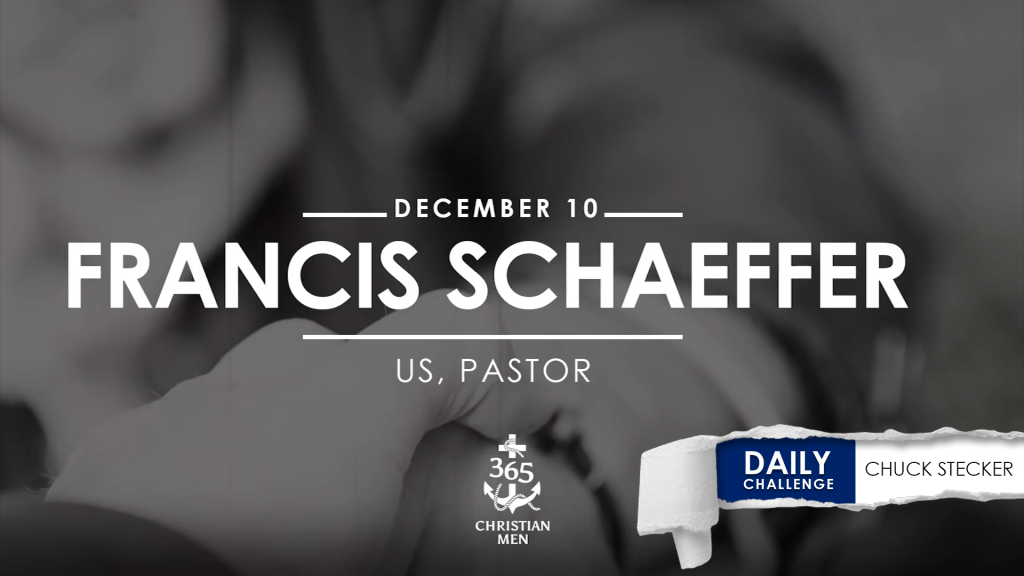December 10. Francis Schaeffer. On this date in 1930, Schaeffer pledged to give his life for God’s service.
Eighteen years later, Schaeffer and his family became missionaries to Switzerland. Within seven years, he established L’Abri, a spiritual community which attracted thousands of followers in the following years.
At first, the Schaeffers opened their home to visitors who wanted to talk about Jesus and philosophy. Visitors were called students, and they spent from a day to several months at L’Abri. Soon more houses opened in the area, and Schaeffer took on a staff, who were available to talk with visitors. After study time, students helped with cooking, cleaning, and household maintenance—based on Schaeffer’s belief that Christianity took in the whole of life.
Schaeffer also wrote at least thirty-nine books. His How Should We Then Live? was so well-received, a documentary film series based on the book was produced, and the book served as the basis for ten major films. Today’s story focuses on Schaeffer when he first started college.
To reach the stubborn, speak the language of perseverance.
“Alright,” the bully told a still-bleeding Francis Schaeffer, “but only if you’ll carry me.”
Schaeffer hadn’t expected to hear that.
Moments earlier, the tall bully had thrown a can of talcum powder into Schaeffer’s face. The can clipped him above the eye, and blood dripped down his brow. The dispute wasn’t over a girl or money or even pride. It was over a prayer meeting.
Schaeffer, then a 20-something first-year college student, had repeatedly invited the other student to attend a prayer meeting in his dorm. And the young man, agitated at Schaeffer’s persistence, finally snapped. He didn’t want to go. He didn’t want to pray. He didn’t want religion.
Perhaps Schaeffer should have expected it. Or ducked.
The college was a mixture of sinners and saints. Some of the young men wanted to party hardy. Others, like Schaeffer, wanted to spread the gospel. Confrontation was bound to happen. Given Schaeffer’s perseverance, it was a matter of how soon and how loud.
Schaeffer’s dorm was infamous and had a reputation for mischief. Students brought their rifles to the building and tucked them away in the corners. They would use them to kill mice and to shoot out the light bulbs in the stairwell. Just for fun.
The guys went out on Saturday nights and stumbled back after midnight, drunk and undeterred by the prohibition laws and college rules.
They also relentlessly hazed the freshmen. If the freshmen disobeyed an upperclassman’s orders, they got spanked with a stick or paddle. Ministerial students like Schaeffer received the harshest treatment. He endured the beatings for a few weeks, but then broke the code by fighting back and pinning his tormentor to the ground.
The hazing stopped.
Professors rarely stepped foot in that dorm. Pre-Schaeffer, the Student Christian Association also wanted nothing to do with that dorm, though they organized prayer meetings in every other dorm on the campus.
And then Schaeffer arrived. He was courageous and daring and even a little reckless. A year earlier, he had pledged his life to God’s service.
He wanted to see men transformed by the gospel—no matter the cost. Even if his boldness for Christ resulted in insults. Even if it resulted in pain. Even if it resulted in a talcum-powder projectile to the head.
After he was hit, Schaeffer didn’t punch the boy. At five-feet-six to the bully’s six-feet-two, that was a sound decision. Instead, Schaeffer did the unthinkable. He repeated the invitation. That’s when the bully agreed to attend … if Schaeffer would carry him.
Perhaps he thought Schaeffer was too weak. Maybe he figured Schaeffer wouldn’t try.
But Schaeffer, still bleeding, used the same technique firemen still use today. He bent over, heaved the tall guy over his shoulders and upper back, and stood upright. He navigated precariously down the dark stairwell and into the meeting room, where he set the guy down.
Schaeffer—persistent and patient—had won.
“Be watchful, stand firm in the faith, act like men, be strong” (1 Corinthians 16:13 ESV).
How do you respond when others challenge or even mock your beliefs? To reach the stubborn, speak the language of perseverance.
Duriez, Colin. Francis Schaeffer: An Authentic Life. Wheaton, Illinois: Crossway, 2005.
“Alumnus Francis Schaeffer and the Spirit of L’Abri.” History. Accessed August 14, 2020. https://www.cogito-hsc.org/our-history/.
Roberts, Mostyn. Francis Schaeffers. Bitesize Biographies Book 1. Grand Rapids, Michigan: Evangelical Press, 2012.
Story read by Chuck Stecker





